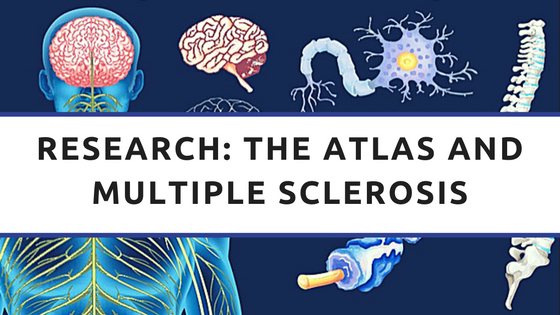Research: The Atlas and Multiple Sclerosis

Read Time: [5 min]
Preliminary results after upper cervical chiropractic care in patients with chronic cerebro-spinal venous insufficiency and multiple sclerosis
Mandolesi S, Marecca G, Moser J, et al.
Ann. Ital. Chir., 2015 86: 192-200.
Summary
Thanks to the hard work and funding of Upper Cervical Health Centers and Upper Cervical Evolutions, we have a this Italian study looking at the effects of upper cervical chiropractic on patients with multiple sclerosis and a clog in their veins called chronic cerebral spinal venous insufficiency (CCSVI).
The idea is that when the veins in the neck are clogged or blocked, then it can have damaging consequences to brain tissue. The idea was pioneered by an Italian physician who used surgery to remove blockages in the major veins in the neck. He’s come under a lot of scrutiny and skepticism, but numerous studies numerous studies have shown that certain patients with MS can experience dramatic improvements. Read more about it here.
How does chiropractic come in to play? It may have to do with the top bone in the neck and it’s relationship with these large neck veins.
The Study
77 patients with MS were selected and screened for atlas displacement and CCSVI. Outcome measures included post x-ray for structural improvement, multiple sclerosis symptom questionairre, and an expanded disability scale.
Results
35.3% reported motor improvement
78% reported preceptive improvement
59.5% reported cognitive improvement
EDSS scores also appeared to improved for certain types of vein blockages.
Limitations
The results certainly look good at a glance, but there are quite a few problems with the paper.
- There’s no control group or comparison data about how a typical MS patient stacks up with their measurements.
- A vaguely described questionaire was used for information about patient self-report.
- Whether it’s a translation problem or poor writing, there are many parts of the paper that are confusing, and I couldn’t follow the action.
- 77 patients were included, but 100 patients had x-ray data included, and only 27 patients had surveys analyzed????
- 3 different MS groups and 3 different CCSVI groups were identified, but analysis on how each group responded was left out.
- The EDSS scores were analyzed but no mention of statistical significance was made. Only that Type 1 and Type 3 CCSVI improved
- The paper frequently mentions CCSVI as the mechanism of interest linking Upper Cervical Chiropractic to MS, but there was no post adjustment measurement of CCSVI to see if it got better
Interesting Tidbits
- This was a step in the right direction by having a Prospective study talking about chiropractic and multiple sclerosis. A lot of you are probably familiar withErin Elster’s study about MS and Parkinson’s Disease.While Elster’s study showed great results, it was also a retrospective study. Retrospective studies allow the researcher to pick and choose what samples are included. In other words, you can publish your positive results, while ignoring all of the patients that didn’t respond.
- Dr Scott Rosa has been doing some pioneering research with upright MRI and the upper cervical spine. He has done some very interesting work showing the way that fluid movement in the brain changes before and after an adjustment.

A shift in the atlas can disrupt fluid in the spine and cause neuroinflammation in the brain. In some cases, this may be tied to MS.
Despite the flaws, there’s a decent number of patients recruited and some promising outcomes.
It also reflects what I often see in my office when patients get their atlas corrected.
Important Notes
- MS is an extremely challenging and disabling disorder. I’ve seen a lot of patients get better with chiropractic, but I’ve seen a lot of patients not have any improvement at all. Currently we don’t have any great way to predict which patients with MS will improve and which won’t, but it seems like the earlier in the disease process someone is in, the better off they will be.
- MS also has large nutritional and autoimmune components that should be addressed. Controlling inflammation and dealing with any dormant infections seem to be important factors.
- Lots of MS patients will tell you that the drugs they have been taken have been pretty disappointing. People with MS are searching for answers in many alternative avenues, so it’s important to give them safe options that can potentially improve their lives.





Leave a Reply
Want to join the discussion?Feel free to contribute!